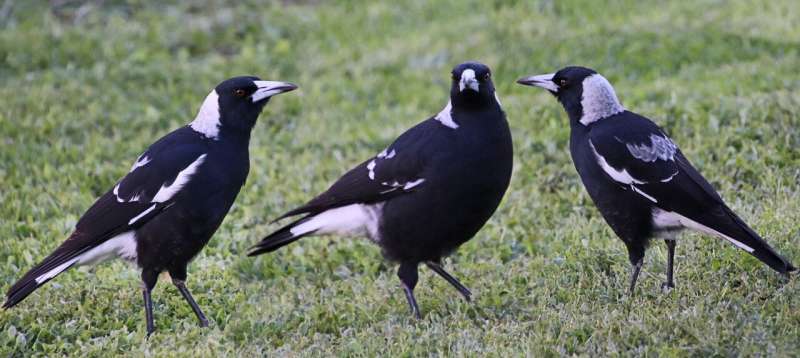This article has been reviewed according to Science X's editorial process and policies. Editors have highlighted the following attributes while ensuring the content's credibility:
fact-checked
peer-reviewed publication
trusted source
proofread
The impact of man-made noise on magpie behavior

Human noise pollution is taking its toll on the iconic Australian magpie, affecting the songbirds' ability to forage for food, communicate and respond to alarm calls—but smart birds are less affected than others.
That's according to new research published today in Global Change Biology, which found loud man-made noises are leaving magpies at a disadvantage.
Lead author of the study, Ph.D. candidate Grace Blackburn from The University of Western Australia's School of Biological Sciences, said man-made noise was altering the everyday lives of magpies, but those with better cognitive performance were better able to deal with this noise.
"We found that loud anthropogenic, or human-generated, noise of above 50 decibels decreased the amount of time magpies spent looking for food, and their foraging efficiency," Blackburn said.
"We also saw that when it's noisy, magpies don't sing or vocalize as much as they do when it's quieter, which can affect how they communicate and interact with each other."
The study found that when there's loud man-made noise, magpies may not hear or respond appropriately to important alarm calls from their groupmates, which helped keep them safe from predators.
"Interestingly, we saw that smarter birds, defined as those that performed better in our cognitive tests, seemed to be more able to maintain their normal response to alarm calls, even when man-made noise was present," Blackburn said.
The researchers used cognitive testing, behavioral observations and playback experiments in their work.
"Until recently, studies looking at the impacts of human noise pollution on wildlife had focused primarily on population-level consequences for species, rather than individual-level impacts," Blackburn said.
"We wanted to investigate not only how human noise affected magpies but whether cognition could help individuals to respond to and cope with this noise."
Blackburn said as human populations grow and expand, understanding the role of cognition in helping magpies to deal with these environmental changes such as man-made noise, could provide important clues to help protect not only this species, but all affected wildlife.
More information: Grace Blackburn et al, Cognition mediates response to anthropogenic noise in wild Western Australian magpies (Gmynorhina tibicen dorsalis), Global Change Biology (2023). DOI: 10.1111/gcb.16975
Journal information: Global Change Biology
Provided by University of Western Australia


















